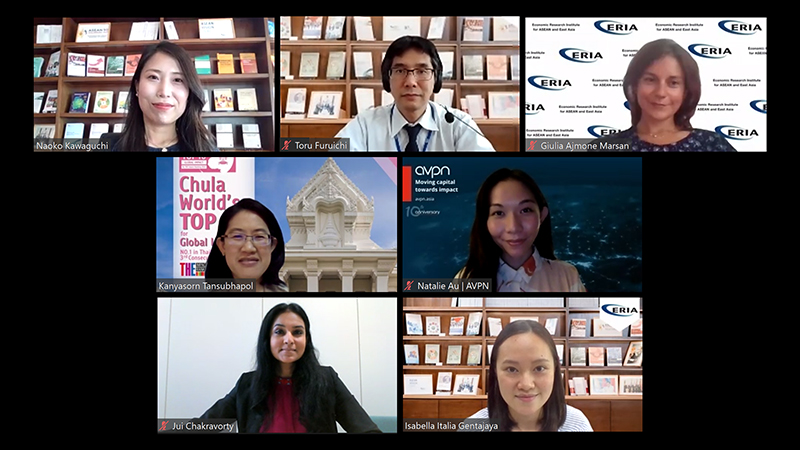Dare to Start: Addressing Gender Gaps in Entrepreneurship in Asia
Date:
5 July 2022Category:
NewsShare Article:
Print Article:
Jakarta, 5 July 2022: Entrepreneurs are the driving force behind economic progress, and rapid economic expansion in Asia has resulted in better socio-economic conditions, including increased and better jobs, increasing educational attainment, rising earnings, and better living standards. Nevertheless, rates of self-employment and firm creation show that gender gaps still exist in numerous sectors, including entrepreneurship. Addressing disparities between men and women entrepreneurs could enhance innovation, create jobs, raise productivity, increase competitiveness, and increase wealth.
Gender gaps in entrepreneurship, raising awareness of them, and finding possible solutions to close them were the focus of a webinar hosted by the Economic Research Institute for ASEAN and East Asia (ERIA) and the Tokyo Centre of the Organisation for Economic Co-operation and Development (OECD) on 5 July 2022. The webinar aimed to bring together expertise and knowledge regarding the region, data, policy, education, and gender issues, and to identify ways to address potential structural and emerging challenges that may be impeding women entrepreneurship. The webinar followed the launch of ERIA’s Entrepreneurship, Start-ups, and Innovation (E-S-I) Knowledge Lab as part of the institute’s ongoing efforts to engage the growing community of innovators, aspiring entrepreneurs, and start-up founders in the region.
In his opening remarks, Mr Toru Furuichi, ERIA’s Director General for Research and Policy Design Administration, expressed gratitude to the webinar’s participants and panellists, and to OECD, which co-organised the event. He noted the importance of the webinar in boosting the momentum of women’s entrepreneurship in Asia from various perspectives, including policy gaps, inclusiveness, and data correction to further promote and raise awareness of the issue.
In the panel discussion, Ms Naoko Kawaguchi, Acting Head of the OECD’s Tokyo Centre, gave a brief progress report on the adherence of its member countries to OECD’s recommendations. She said empowering women and tapping untapped sources can result in more sustainable and inclusive economic growth. She shared that across the OECD countries, gender gaps in entrepreneurship have slightly narrowed, although women experience greater barriers than men in setting up and maintaining businesses. Nevertheless, she said, addressing gender equality and promoting diversity are pivotal in pushing economic growth.
Ms Kanyasorn Tansubhapol, Assistant to the President for Special Affairs of Chulalongkorn University, narrated how the university president had proposed to the university council setting up an innovation hub to encourage lecturers and researchers to demonstrate their research into practical application. She said women mentorship is important, citing cases of alumni who encouraged women to take part in research.
Dr Giulia Ajmone Marsan, ERIA’s Director for Strategy and Partnership, said it is important to promote more women to tap into the digital economy amidst the robust digital transformation, especially in the post-pandemic period. Bridging the gap is urgent, she added, so women and men can equally benefit from the digital transformation. She stated further that educational institutions play a critical role in tackling social norms and biases in gender through a set of collective actions. She urged the promotion of more women representatives in leadership positions and gender diversity to foster innovative solutions.
Ms Natalie Au, Senior Associate for the Gender Platform of the Asian Venture Philanthropy Network, pointed out the importance of supporting economic empowerment of women as they often face double burdens in the household. She called for the promotion of science, technology, engineering, and mathematics education for women and girls. She added that promoting the gender lens in the investment ecosystem is important as women usually face difficulties in obtaining funding to support their women-led businesses. But she noted a trend among investors of promoting new models of innovative finance that facilitate better access to financing for women entrepreneurs.
The panel discussion was moderated by Ms Jui Chakravorty, Special Projects Editor of Nikkei Asia. She shared her experience as a woman who had faced problems in obtaining funding on her own entrepreneurship journey. She closed by saying that being daring to start is the first step, but one must also learn to think holistically and foster the right kind of support to help build a pipeline that will allow women to succeed.








